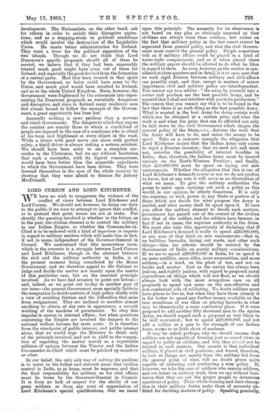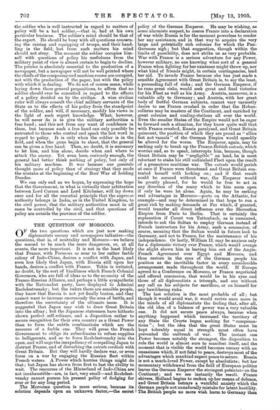W E have no wish to exaggerate the violence of the
conflict of views between Lord Kitchener and Lord Curzon. We should not, however, be doing our duty to the public if we were to attempt to ignore that conflict, or to pretend that great issues are not at stake. Put shortly, the question involved is whether in the future, as in the past, the civilian element is to control the military in our Indian Empire, or whether the Commander-in- Chief is to be endowed with a kind of imperism in imperio in regard to military matters which will make him in fact, • if not in name, independent of the Governor-General in Council. We understand that this momentous issue, which in the concrete is a struggle between Lord Curzon and Lord Kitchener, though in the abstract between the civil and the military authority in India, is at the present moment being considered by the Home Government, and we therefore appeal to the Cabinet to judge and decide the matter not merely upon the merits of this particular case, but on the essential principle involved. As we have had occasion to point out before— and, indeed, as we point out to-day in another part of our issue—the present Government seem specially liable to the temptation to decide matters of high policy chiefly with a view of avoiding friction and the difficulties that arise from resignations. They are inclined to sacrifice almost anything to obtain, at any rate in appearance, a smooth -working of the machine of government. To obey this impulse is unwise in internal affairs ; but when questions concerning the Empire are involved the dangers to -the national welfare become far more acute. It is therefore from the standpoint of public interest, and public interest alone, that we would urge the Ministry to think only of the principle involved, and. not to yield to the tempta- tion of regarding the matter merely as a regrettable collision of opinion between the Viceroy and the Indian Commander-in-Chief which must be patched up somehow or other.
In our belief, the only safe way of solving the problem is to insist in the fullest and strictest sense that civilian control in India, as at home, must be supreme, and that the final responsibility for military as for civil affairs must be borne by the Governor-General in Council. It is from no lack of respect for the ability of our great soldiers, or from any want of appreciation of Lord Kitchener's special qualifications, that we insist upon this principle. The necessity for its observance is not based on any plea so obviously unsound as that civilians are always wiser than soldiers, but rather on the fact that military policy in the last resort cannot be separated from general policy, and that the civil Govern- ment must control the general policy. People sometimes talk as if military affairs could be placed in a kind of water-tight compartment, and as if when placed there the military expert should be allowed to do what he likes in regard to them. As soon, however, as the matter is con- sidered at close quarters and in detail, it is at once seen that no such rigid division between military and civil affairs can possibly exist, and that, except in matters of minor importance, civil and military policy are interdependent. You cannot say to a soldier : "Go away by yourself into a corner and produce me the best possible Army, and be assured that I shall not interfere with you in its production." The reason that you cannot say this is to be found in the fact that there is no such thing as the best possible Army. What is wanted is the best Army for doing certain work which can be obtained at a certain price, and what the work is and what the price that can be afforded can only be laid down by the civil Government which shapes the general policy of the State,—i.e., dictates the work that the Army will have to do, and raises the money to be spent. Take as a concrete example the allegation that Lord Kitchener insists that the Indian Army only exists to repel a Russian invasion ; that we need not, and must not, consider the possibility of internal troubles in India; that, therefore, the Indian Army must be located entirely on the North-Western Frontier ; and finally, that £20,000,000 must be spent on laying out new cantonments. Whether the allegation that this is one of Lord Kitchener's demands is true or not we do not profess to know, but at any rate it will serve as an illustration of what we mean. To give the military authorities the power to insist upon carrying out such a policy as this would, in our opinion, be utterly disastrous. It is only the supreme, or civil, power in any State or portion of a State which can decide for what purpose the Army is needed, and what money shall be spent upon it. If once you allow the military element to decide such matters, government has passed out of the control of the civilian into that of the soldier, and the soldiers have become, in fact if not in name, the supreme authority in the State. We must also take this opportunity of declaring that if Lord Kitchener's demand is really to spend £20,000,000, or any sum of that kind, on new cantonments—that is, on building barracks, laying out roads, and other such things—then his scheme should be resisted by the Government of India on purely military considerations. If we are to spend £20,000,000 in India, let us spend it on more artillery, more rifles, more ammunition, and more soldiers,—in a word, on the plant of war, and not on bricks and mortar.. Just as the nation has always been jealous, and rightly jealous, with regard to proposed naval expenditure on things which will not float, so we should always look with the most scrupulous care on all proposals to spend vast sums on the non-effective and non-combatant side of soldiering. No doubt soldiers must have places to live in, but when they have those already it is far better to spend any further money available on the true munitions of war than on placing barracks in what may be theoretically a more convenient place. If it were proposed to add another fifty thousand men to the native Army, we should regard such a proposal as very likely to be well warranted ; but to spend £20,000,000, and not add a soldier or a gun to the strength of our Indian force, seems to us little short of madness.
It may be asked, perhaps, why we should assume that soldiers are not capable of forming just as sound views in regard to policy as civilians, and why they should not be trusted in such matters. Our answer is that individual soldiers, if placed in civil positions, and forced, therefore, to look at things not merely from the military but from the general point of view, will no doubt prove quite capable of initiating and conducting a wise policy. If, however, we take the case of soldiers who remain soldiers, and are intent on military work, then we say without hesi- tation that they are not the proper people to determine questions of policy. Their whole training and their absorp- tion in their military duties make them of necessity un- fitted for deciding matters of policy. Speaking generally, the soldier who is well instructed in regard to matters of policy will be a bad soldier,—that is, bad at his own particular business. The soldier's mind should be that of the expert. He should be busy with all questions concern- ing the raising and equipping of troops, and their hand- ling in the field, but frcim such matters his mind should not stray. The moment the soldier occupies him- self with questions of policy his usefulness from the military point of view is almost certain to begin to decline. The printer is absolutely essential to the production of a newspaper, but a newspaper will not be well printed, where the chiefs of the composing and machine rooms are occupied, not with the production of the paper, but with the policy with which it is dealing. We do not of course mean, while laying down these general propositions, to affirm that no soldier should ever be consulted in regard to the effects of a policy decided on by the civilian. A wise civilian ruler will always consult the chief military servants of the State as to the effects of his policy from the standpoint of the soldier, and will, if necessary, modify his views in the light of such expert knowledge. What, however, he will never do is to give the military authorities a free hand ; and this not from any want of confidence in them, but because such a free hand can only possibly be entrusted to those who control and speak the last word in regard to policy. It is only when the soldier is in the field, and when the guns begin to shoot, that the general can be given a free hand. Then, no doubt, it is necessary to let him, and him alone, decide when and where to attack the enemy. Yet even here, curiously enough, the general had better think nothing of policy, but only of his military machine. It was because our generals thought more of policy than of strategy that they made the mistake at the beginning of the Boer War of holding Dundee.
We can only end as we began, by expressing the hope that the Government, in what is virtually their arbitration between Lord Curzon and Lord Kitchener, will lay down once and for all the essential principle that the supreme authority belongs in India, as in the -United Kingdom, to the civil power, that the military authorities must in all cases be controlled by the civil, and that questions of policy are outside the province of the soldier.







































 Previous page
Previous page